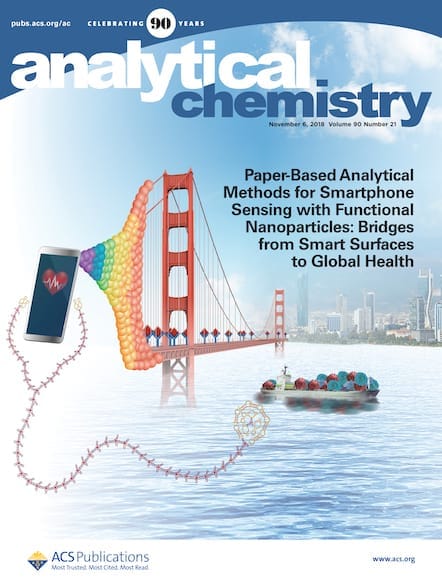The award honors the contributions of an individual who has demonstrated exceptional technical advancement and innovation in the field of microfluidics or nanofluidics in thei early career.

Dr. Sunitha Nagrath is an Associate Professor of Chemical Engineering at the University of Michigan and the winner of the 2018 Analytical Chemistry Young Innovator Award. The award honors the contributions of an individual who has demonstrated exceptional technical advancement and innovation in the field of microfluidics or nanofluidics in his or her early career. Analytical Chemistry and The Chemical and Biological Microsystems Society (CBMS) sponsor the award.
“Professor Sunitha Nagrath has created an exciting interdisciplinary program at the interface of measurement science, engineering, biology, and medicine,” says Analytical Chemistry Editor-in-Chief Jonathan V. Sweedler. “She has made many significant contributions to rare cell detection and isolation and is highly deserving of being the next Analytical Chemistry Young Innovator.”
As the 2018 Analytical Chemistry Young Innovator Award winner, Dr. Nagrath will receive a $2,500 honorarium and $1,500 in travel and accommodations funding to attend the 22nd International Conference on Miniaturized Systems for Chemistry and Life Sciences (μTAS 2018) in Kaohsiung, Taiwan, November 11-15.
If you are attending μTAS 2018, Analytical Chemistry and CBMS hope you will come and see Dr. Nagrath at the Analytical Chemistry Young Innovator Award and Presentation, held from 8:40 – 9:00 a.m. on Wednesday, November 14.
An Interview with Sunitha Nagrath
I caught up with Dr. Nagrath recently to learn more about her research and what she will be doing next. Here are the highlights of our conversation.
In your early years, was it difficult to choose between becoming a doctor of medicine or a Ph.D. researcher?
Not really, as mathematics was my all-time favorite subject but biology was not, so I naturally chose to become an engineer in my earlier years. However, in later years during my postdoc, when I started developing technologies for life sciences applications, I did want to go and get an M.D. degree.
Did you plan to incorporate aspects of biology, engineering, and medicine together in your work, or did it come naturally to you to meld these different disciplines together translationally?
I had a clear objective of working on health sciences-related projects. I found a serious gap between the technological advances engineers have and the need for innovative tools for better disease management at the clinical level. Working at the interface of biology, engineering, and medicine is the only natural solution to achieve that objective. Hence it was natural and driven by my passion to bring the state-of-the-art technologies to patient care, especially in cancer.
Could you explain what precision medicine means in your work?
When a cancer patient walks into a clinic, thanks to the latest research advances, fortunately, most of the time, clinicians have a choice of prescribing the medicine based on the phenotype and/or genotype of that patient’s cancer. However, the patient might have to go through treatment A, B, C, until he or she responds to one of those choices. In some case, the response is partial, and the patient waits until the disease progress, then gets put on a different drug.
Is there a way we can screen these five or six drug choices with the patient’s own cancer cells taken from a blood test, determine the most effective drug, and then put the patient on that drug from day 0? This is precision medicine to me.
Can we monitor the patient’s response or resistance, and changes in genotype with precision using a blood-based test? That is precision medicine to me.
Can we improve the survival rates by identifying the right targets with precision using a blood-based test? That is precision medicine to me.
Describe how your innovative microfluidic devices enable the analysis of circulating tumor cells for cancer detection and treatment.
Circulating tumor cells (CTCs) caught our attention more than a decade ago. However, they have not yet taken the center stage of precision medicine despite their unique advantages when compared with either tradition tissue-based or other blood-based biomarkers. Their challenges include limited sensitivity, throughput, and complexity of the assay.
My lab has been pioneering technologies that address these very limitations to implement CTCs, not only as robust biomarkers for cancer progression, monitoring, and identifying therapeutic targets but also as functional biomarkers for therapeutic testing. My lab is developing high-throughput, yet highly specific, technologies for not only isolating CTCs but also analyzing them at the single-cell level. Furthermore, with the help of the microfluidic technologies developed in our lab, we isolate viable cells and can expand them ex vivoto be able to screen various drug compounds to implement the precision medicine for cancer management.
What is next for your research?
Early detection of cancer can save many lives. This is equivalent to the Holy Grail of cancer. Since we are engineers working at the interface of biology and medicine, we can come up with innovative tools to be able to screen the high-risk population for early detection. The key to early detection is also understanding cancer cells’ dissemination and the biological diversity of disseminated cells.
Nominate a Colleague for the 2019 Analytical Chemistry Young Innovator Award
Do you know an individual who has demonstrated exceptional technical advancement and innovation in the field of microfluidics or nanofluidics in his or her early career? If so, nominate them for the 2019 Analytical Chemistry Young Innovator Award.
The award is sponsored by Analytical Chemistry and CBMS. They are accepting nominations through May 3, 2019.
